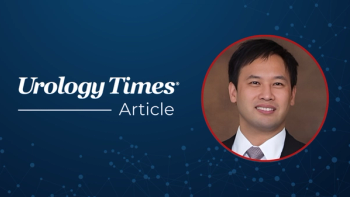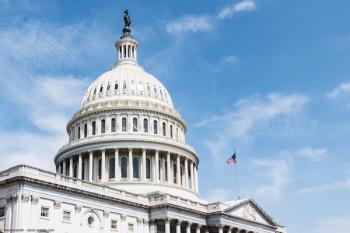
AUA presses policy goals at summit
Bob Gatty recaps the recent Annual Urology Advocacy Summit in Washington.
One lesson that organizations representing urology have learned over the years is that to successfully advocate on behalf of urologists in Washington, it takes a concerted, year-long effort that is sharply focused and strategically driven.
Yes, the Annual Urology Advocacy Summit in Washington, which attracted more than 250 attendees and resulted in more than 180 urologists, researchers, and patient advocates participating in nearly 200 meetings with lawmakers and staffs, was an important cornerstone event representing the entire urology community.
Yes, attendees were updated on key practice developments such as prostate cancer disparities, active surveillance, and the cost-effectiveness of prostate cancer treatment. But the importance of working together for advocacy was emphasized in a March 12 session moderated by David F. Penson, MD, MPH, AUA chair of health care policy.
“Prostate cancer advocacy is multi-faceted and it’s important for our advocates to understand that,” Dr. Penson said. “While USPSTF reform is paramount for us, the conversation isn’t just about screening. Understanding the role of active surveillance, the shift toward value-based medicine, and how we can work effectively in tandem with our patients is critical.”
Dr. Penson was referring, of course, to efforts by the major urology organizations to convince Congress to approve legislation designed to reform the U.S. Preventive Services Task Force (USPSTF), which has issued recommendations regarding prostate cancer screening that they believe are misguided and could be harmful to patients.
Next: Five major legislative initiativesFive major legislative initiatives
In fact, one of five major legislative initiatives discussed during the summit and high on the AUA’s priority list was the USPSTF Transparency and Accountability Act, introduced by Reps. Marsha Blackburn (R-TN) and Bobby Rush (D-IL).
That legislation would require the USPSTF to:
• publish research plans and make available reports on such evidence and recommendations for public comment
• ensure medical specialty physicians are consulted
• establish a stakeholders board to ensure input on developing, updating, publishing, and disseminating evidence-based recommendations
• codify the current grading system so it can’t be changed without review
• ensure that Medicare and other payers cannot deny payment for a preventive service solely based on the task force grade.
Other key public policy priorities for AUA discussed during those Capitol Hill meetings included:
Reducing the burden related to the use of certified electronic health record technology (CEHRT). The AUA urged Congress to encourage the Office of National Coordinator for Health Information Technology to examine the cost of operating and upgrading CEHRT, including the financial and administrative burden on physician practices, hospitals, and health systems for routine upgrades and maintenance. The AUA also urged lawmakers to co-sponsor S.2059, the “EHR Regulatory Relief Act,” which would make permanent a 90-day reporting period for the Advancing Care Information performance category of the Merit-based Incentive Payment System and provide flexibility for scoring under that category.
Steps to alleviate the urologic work force shortage. Lawmakers were urged to co-sponsor the “Resident Physician Shortage Reduction Act” (H.R.2267/S.1301) introduced by Reps. Joseph Crowley (D-NY) and Ryan Costello (R-PA) and Sens. Bill Nelson (D-FL), Dean Heller (R-NV), and Charles Schumer (D-NY). That bill would increase the number of Medicare GME residency slots by 15,000 over the next 5 years, direct half of the newly available positions to training in shortage specialties, prioritize distribution of the new slots, and study strategies to increase the diversity of the health professional work force.
Next: Creation of an Office of Men's HealthCreation of an Office of Men’s Health within the U.S. Department of Health and Human Services (HHS). Such an office would conduct, support, coordinate, and promote programs and activities to improve the state of male health in the U.S. It would:
• coordinate public awareness programs and activities related to male health, including prostate cancer, diabetes, colorectal cancer, cholesterol, and mental health screening programs, including for men identified as being at increased risk for these diseases
• support comparative effectiveness review related to these diseases
• establish a clinical registries database to assess and measure quality improvement of programs and activities relating to male health.
Support of federal funding for urologic research in the Department of Defense Congressionally Directed Medical Research Programs (CDMRP). The DoD CDMRP encompasses a wide range of conditions such as breast and ovarian cancers, neurofibromatosis, military health, and other specified areas including urologic conditions like prostate, kidney, and bladder cancers and interstitial cystitis. The DoD appropriations to fund CDMRP are added every year during the budget approval cycle by members of the House or Senate, in response to requests by consumers and disease survivors. In FY 2017, Congress provided $1.117 billion for the 31 programs in the CDMRP. To date, these programs are operating under a continuing resolution and when that funding runs out, no further research can be supported.
While the summit is an important part of urology’s public policy initiative, it is only one component of AUA’s advocacy strategy, said Christopher M. Gonzalez, MD, MBA, chair of the AUA’s Public Policy Council.
“In the months following the Annual Urology Advocacy Summit, our three DC-based lobbyists will continue to work to garner co-sponsors, set up local meetings with attendees and their lawmakers back home, and continue to engage urology residents and young urologists in order to lay the foundation for the next generation of AUA member advocates,” Dr. Gonzalez said. “In 2017, our advocates held more than 330 total Congressional Hill visits and we’re already well on our way to surpassing this number in 2018.”
Newsletter
Stay current with the latest urology news and practice-changing insights — sign up now for the essential updates every urologist needs.






